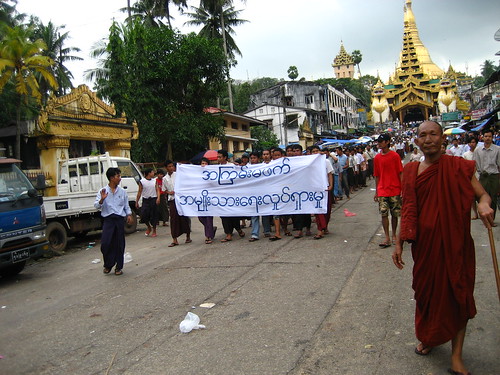I&D Releases New Case Study on Burma’s Saffron Revolution
September 29th, 2008 — Tim Hwang

Over the past few months, the Internet and Democracy team has been hard at work producing a new set of case studies that take a closer look at the complex role of technology in the creation, progress, and outcomes of domestic crisis. This follows up from our previous case study work earlier this spring into the makeup of the Iranian blogosphere, and from last December into the role of networked technologies in Ukraine’s 2004 Orange Revolution.
To coincide with the first anniversary of the internet blackout in Burma, we’re announcing today the official release of our study of the 2007 Saffron Revolution, available here.
Chowdhury’s research challenges long-held assumptions about the capacity for widely adopted information technologies to subvert authoritarian regimes and promote useful societal discourse. In practice, the relationship of technology to politics seems to be far more intricate than these broad notions would suggest, and indicate many possibilities for further research. As he writes in the abstract:
The 2007 Saffron Revolution in Burma was in many ways an unprecedented event in the intersection between politics and technology. There is, of course, the obvious: the event marks a rare instance in which a government leveraged control of nationalized ISPs to entirely black out Internet access in an attempt to prevent images and information about the protests from reaching the outside world. At another level, it is an example of an Internet driven protest which did not lead to tangible political change.
Looking forward to seeing what you guys think about it!
Update: You can read Veronica Alfaro’s response to the Burma case study here.
(photo courtesy racoles, CC BY)






 Click Here
Click Here
October 2nd, 2008 at 3:54 pm
[…] friend and New School Doctoral Candidate Veronica Alfaro responds to our Burma case study, and encourages a broader view. Veronica writes: The article seems to express a certain […]
March 18th, 2009 at 8:49 am
This paper is really useful and offers a good analysis, it is very rare to find research on Myanmar political technology movement. I think there are insufficient real Myanmar case studies. Most Myanmar blogs and news websites are written in the Myanmar language. This restricts the amount of international research that can be done. I have stong evidence that the Myanmar Cyber world has motivated world people to act with the result of tangible political change . This paper also doesn’t discuss the progovernment online movement, for example progovernment blogs and the counter information war on Myanmar exile groups. This is an important aspect of Myanmar cyber culture.